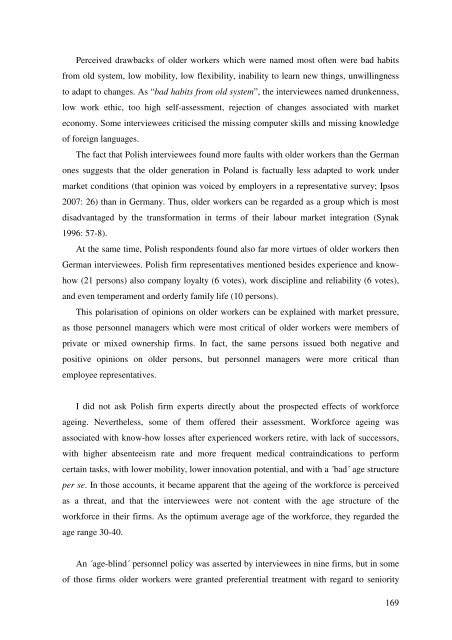Dissertation_Paula Aleksandrowicz_12 ... - Jacobs University
Dissertation_Paula Aleksandrowicz_12 ... - Jacobs University
Dissertation_Paula Aleksandrowicz_12 ... - Jacobs University
Create successful ePaper yourself
Turn your PDF publications into a flip-book with our unique Google optimized e-Paper software.
Perceived drawbacks of older workers which were named most often were bad habits<br />
from old system, low mobility, low flexibility, inability to learn new things, unwillingness<br />
to adapt to changes. As “bad habits from old system”, the interviewees named drunkenness,<br />
low work ethic, too high self-assessment, rejection of changes associated with market<br />
economy. Some interviewees criticised the missing computer skills and missing knowledge<br />
of foreign languages.<br />
The fact that Polish interviewees found more faults with older workers than the German<br />
ones suggests that the older generation in Poland is factually less adapted to work under<br />
market conditions (that opinion was voiced by employers in a representative survey; Ipsos<br />
2007: 26) than in Germany. Thus, older workers can be regarded as a group which is most<br />
disadvantaged by the transformation in terms of their labour market integration (Synak<br />
1996: 57-8).<br />
At the same time, Polish respondents found also far more virtues of older workers then<br />
German interviewees. Polish firm representatives mentioned besides experience and knowhow<br />
(21 persons) also company loyalty (6 votes), work discipline and reliability (6 votes),<br />
and even temperament and orderly family life (10 persons).<br />
This polarisation of opinions on older workers can be explained with market pressure,<br />
as those personnel managers which were most critical of older workers were members of<br />
private or mixed ownership firms. In fact, the same persons issued both negative and<br />
positive opinions on older persons, but personnel managers were more critical than<br />
employee representatives.<br />
I did not ask Polish firm experts directly about the prospected effects of workforce<br />
ageing. Nevertheless, some of them offered their assessment. Workforce ageing was<br />
associated with know-how losses after experienced workers retire, with lack of successors,<br />
with higher absenteeism rate and more frequent medical contraindications to perform<br />
certain tasks, with lower mobility, lower innovation potential, and with a ´bad´ age structure<br />
per se. In those accounts, it became apparent that the ageing of the workforce is perceived<br />
as a threat, and that the interviewees were not content with the age structure of the<br />
workforce in their firms. As the optimum average age of the workforce, they regarded the<br />
age range 30-40.<br />
An ´age-blind´ personnel policy was asserted by interviewees in nine firms, but in some<br />
of those firms older workers were granted preferential treatment with regard to seniority<br />
169
















